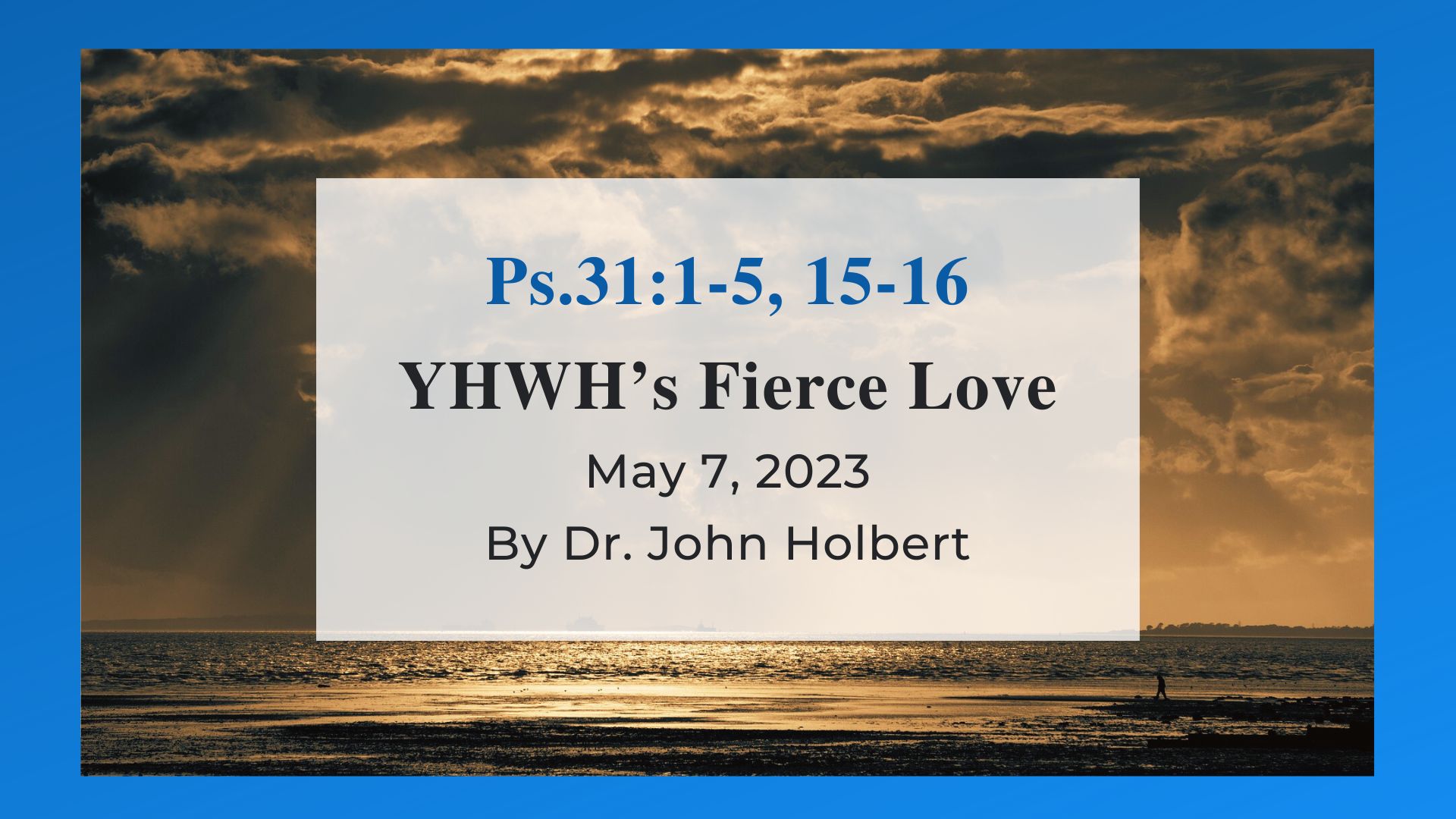YHWH’s Fierce Love - Reflections on Ps.31:1-5, 15-16
by Dr. John Holbert on Monday, May 1, 2023

YHWH’s Fierce Love
Ps.31:1-5, 15-16
The Peripatetic Hebrew Bible Preacher
I have done some thinking recently about the meaning of the ubiquitous Hebrew word, chesed. It is a notoriously difficult word to translate into English or any other language for that matter. The NRSV’s choice has been “steadfast love,” implying thereby, I assume, that the love of God is resolute, determined, persevering, unflinching, unfaltering. English is replete with synonyms for the full import of this word, a word commonly employed to speak of YHWH’s central gift, YHWH’s most basic characteristic (see Exodus 34 for the finest descriptor of this basic divine characteristic). The word is used to describe human relationships as well, but it is YHWH’s chesed that regularly appears in contexts that attempt to delineate just how it is that YHWH is best to be understood in interactions with human beings.
The word occurs some 245 times in the Hebrew Bible, more than half of those uses appearing in the Psalms (127). There is nothing at all objectionable to me about the NRSV’s rendering, but it seems that there is something more about it that needs saying if one is to capture the deeper and fuller range and power of what it can mean. As an attempt to capture that richer import, I now propose that it be translated “YHWH’s fierce love.” I know full well that the word “fierce” is often used in contexts of savagery and bestiality, a description of the behavior of wild animals, and thus perhaps not the first word that comes to mind when considering the saving and protective love of God. Yet, in translating a quite famous passage from Micah recently, it seemed to me all the more important to get this wild element of God’s love into the English rendering.
Micah 6:8 has become nearly cliched, made so especially by Martin Luther King Jr.’s use of it in any number of his sermons. The ancient prophet is contrasting the sumptuous sacrifices to YHWH, brought by the “fat cats” of Jerusalem to YHWH in the temple: vast rivers of oil, great herds of fatted beasts, even first-born children to assuage the anger of YHWH. MLK, employing the RSV, read: “To do justice, to love mercy (or “kindness”), and to walk humbly with your God.” I find both “mercy” and “kindness” far too weak in English to portray what Micah seems to want to say here. Instead of traditional physical sacrifices, he wished to portray what YHWH really wants from us. “Justice” first, he says. And the final two activities he demands are, I read, “to embrace YHWH’s fierce love” (literally it says: “Love chesed”), and finally “walk continuously with your God” (I find no evidence at all that this word used means anything like “humbly”).
If such a reading of chesed is possible and useful, then Ps.31:16 possesses significant power. This psalm is a poem of praise for deliverance by YHWH from the power of certain unnamed enemies. “My times are in your hand,” the poet professes to YHWH, and then urges YHWH to “deliver me from my persecuting enemies” (Ps.31:15). Such powerful and implacable foes cannot be vanquished by “kindness”! They must be defeated by something much more potent. “Let your face shine on your servant,” the poet asks, recalling the famous Levitical blessing in Numbers 6. The poet then adds, “Save me with your fierce love (chesed)” (Ps.31:16). It is that sort of love that can stand in the face of enemies, that can overcome the implacable depredations of all sorts of foes.
Earlier in the poem, images like “refuge” and “rock of refuge” and “fortress” are used and repeated to describe the sort of God the psalmist needs to persevere and stand in times of dangerous trouble. That fortress God, that God as rock, is a God whose love is fierce, far more than “merciful,” far more than “kind”. I am suggesting here that the love of God we hymn and hope for and need is a fierce and wild love, an implacable attribute of the God we try, with our tiny human love, to adore in return. In the days we live in now, we need to say, with the poet of Ps.31, that “our times are in your hand, O God; save me (us) with your fierce love.”
